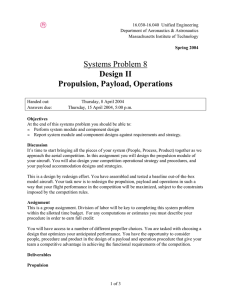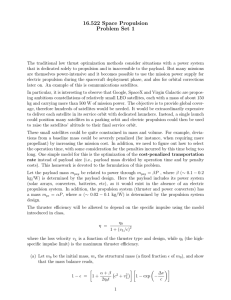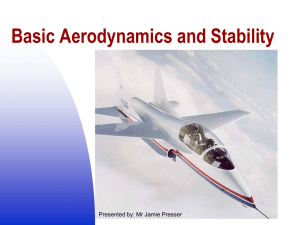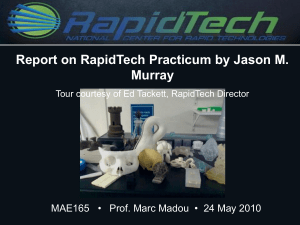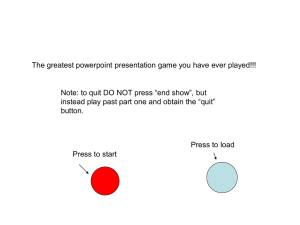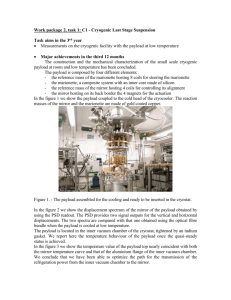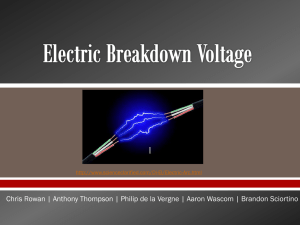Laser Rockets & SSP
advertisement
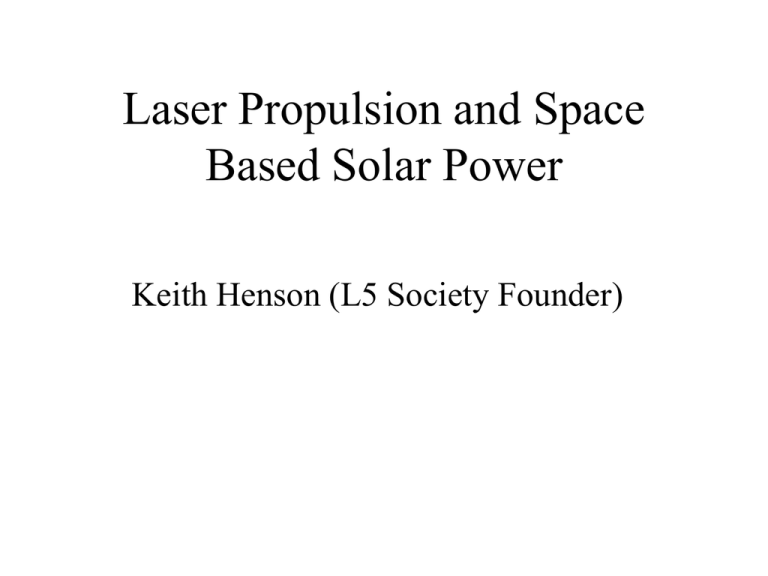
Laser Propulsion and Space Based Solar Power Keith Henson (L5 Society Founder) Power down to Earth via lasers. What does this have to do with Transhumanism? Running out . . . . Carbon problems The Basic Idea Build one power satellite the hard way. Equip it with propulsion lasers Bring up material to build hundreds using the first one. Build more propulsion lasers as well. Undercut/displace fossil fuels. Three years ago Three weeks ago What changed? Google China India Power Satellites Last week in the news . . . THE SABRE ENGINE HEAT EXCHANGER First SABRE Pre-cooler Module This was manufactured in 2004 SABRE Pre-cooler Demonstration Can’t be done with chemical fuel • • • • • Current $20,000/kg to GEO SpaceX $4,000/kg $1,000/kg 20t/1400t, 1.4% payload Skylon ~$1000/kg $500/kg 7t/300t, 2.3% payload Hydrogen combustion to 25 km, & Mach 5.5 Laser heated hydrogen above that point (laser beamed down from GEO) • • • • • 2.3 to 3.4 GW of laser Performance analysis, 54 t to LEO Vehicle 24 t, (20% structure) plus 30 t second stage to LEO 2/3rd of second stage to GEO (20 t) 900 s, 6 deg sweep over ~4000 km. 5845 m/s velocity gain on 2.3 GW GEO 320km perigee 270 MW laser source after 5 hrs 760 s, 11 deg sweep over 6950 km. 2500 m/s velocity gain GEO 140 s, 1630 m/s 3670 km 320km perigee Hohmann transfer orbit 5 hr $0 0 2 4 6 8 -$20,000 Millions of dollars -$40,000 -$60,000 -$80,000 -$100,000 -$120,000 -$140,000 -$160,000 Years from start 10 12 14 Growth: 100GW/year, ten percent (10 GW) used for more propulsion, triples the cargo capacity to 1.5 M t/y, 300 GW/year. Triple that and the expansion rate is almost a TW/year. It's possible that humanity could be mostly off fossil fuels in two decades. (Sandy is a factor.) End of talk http://hplusmagazine.com/2012/04/12/ transhumanism-and-the-humanexpansion-into-space-a-conflict-withphysics/ BUT—It is too big to do without major government backing • And oil, coal and gas industries will lobby against a real solution. (Maybe not) • So why should a government consider backing it? 3.00 2.50 GW 2.00 1.50 1.00 0.50 0.00 0 2 4 6 Ve km/s 8 10 12 40. 00 35. 00 30. 00 25. 00 Payload Percent 20. 00 15. 00 10. 00 5. 00 0. 00 0 2 4 Ex 6 Exhaust Velocity km/s 8 10 12 Payload cost as a function of exhaust velocity Cost per kg 160.00 140.00 120.00 100.00 80.00 60.00 40.00 20.00 0.00 0 2 4 6 Exhaust velocity km/s 8 10 12 Cost breakdown •Vehicle amortization $10/kg •Hydrogen $6/kg •Laser $50 B (written off in 5 years) •$10 B/0.5 B kg is $20/kg •$36/kg, well under the $100/kg number •Profit more than $50/kg Completing 2.3 to 3.4 GW •$ 34 B laser/power sat parts, 17,000 tons •60 ¼ scale vehicles, 5 tons to GEO •20 flights per day, 170 days, 2 years total •Transport cost @ $100/kg $1.7 B •Total cost $50-100 B •Income @ $100/kg * 500,000 t $50 B/yr •Payback from profit 3-4 years. Chemical rocket (and planes) can't build power sats but they can build a large, expensive laser • 3.4 GW electric power at 2 cent per kWh is worth $480 M/yr • 3.4 GW of laser propulsion is worth $50 B/yr • >100 times as much Part 4 This makes a business case • It closes the business case for making 2 cent per kWh power and we know there is plenty of market at that price (TWs) • It solves energy, energy security and carbon problems (carbon neutral synthetic fuel for a dollar a gallon) • Even at two cents per kWh it makes huge profits to support growth. Simple analysis • 10 year return on capital, 80,000 hours • $1600/kW can be paid back at 2 cents per kWh (Below coal to get market share) • $200/kW rectenna, $900/kW parts and labor ($450 before transmission loss), $500/kW for transport to GEO • At 5 kg/kW requires • $100/kg or less to GEO It costs perhaps 10% of what a war with Iran would cost • SDI with the USSR or Russia was/is a losing business. • It will be decades before Iran could overwhelm a multi GW propulsion laser and by that time the commercial demand for laser propulsion should be in the tens of GW • Cheap power from space removes any legitimate reason to sort out uranium atoms Google “henson oil drum” for a slightly out of date “white paper” on this topic • • • • Part 1 months ago Part 2 and 3 a few weeks ago Part 4 last week This is unlikely to be the final evolution of the idea. Why Airdrop at 10 km • Large Landing gear reduction • Max landing is 54 tons, 120 t less 76 tons of LH2 dumped in an abort. OVERALL CONFIGURATION OF GEOSYNCHRONOUS SPS (FROM DOE STUDIES) SPACEBORNE ARRAY RECTENNA ON EARTH Percent payload (blue) GW x 10 (orange) Ve vs Payload % and GW (x10) for 6 km /s delta V 50 kg/s hydrogen feed, 20% structure Percent payload (blue) GW x 10 (pink) 60 50 40 30 60.00 50.00 40.00 30.00 20.00 10.00 0.00 0 2 4 6 8 10 12 Ve km /s 20 10 0 4 5 6 7 8 9 10 11 Ve vs Payload % and MW/10 for 4.1 km /s delta V, 15,000 kg starting m ass 70.00 Percent payload (blue) MW /10 (pink) 60.00 50.00 40.00 30.00 20.00 10.00 0.00 0 2 4 6 Ve km /s 8 10 12 Payload kg per MW and $/kg vs Ve for 4.1 km /s delta V 45.00 Payload kg per MW (blue) and $/kg (pink) 40.00 35.00 30.00 25.00 20.00 15.00 10.00 5.00 0.00 0 2 4 6 Ve km /s 8 10 12 40 kg, but just scaling from MW to GW, move to Equator, cover mountain with gyrotrons, run 4 minutes out of 20, 11 million truck batteries, 5 years and they die, but in that time 500 GW of SBSP. Silly to send power down and back up so . . . . 3.00 2.50 GW 2.00 1.50 1.00 0.50 0.00 0 2 4 6 Ve km /s 8 10 12 Percent payload (blue) GW x 10 (pink) Ve vs Payload % and GW (x10) for 6 km/s delta V 50 kg/s hydrogen feed, 20% structure 60.00 50.00 40.00 30.00 20.00 10.00 0.00 0 2 4 6 Ve km/s 8 10 12 Payload percent per GW and $/kg vs Ve for 6 km/s delta V Payload percent per GW (blue) and $/kg (pink) 180.00 160.00 140.00 120.00 100.00 80.00 60.00 40.00 20.00 0.00 0 2 4 6 Ve km/s 8 10 12 105 kW CW Getting started (Building a seed laser) • • • • • small scale, 500 MW @ 10 kg/kW 5000 tons, Falcon Heavy @ 20 t per flight 250 flights at 0.1 B/flight, $25 B $5 B laser at $10/W 500 days at a launch every other day

